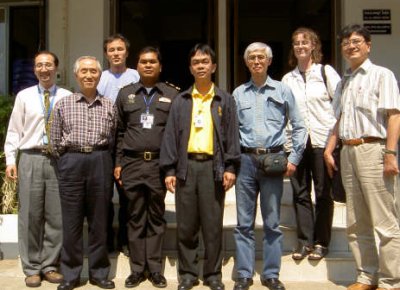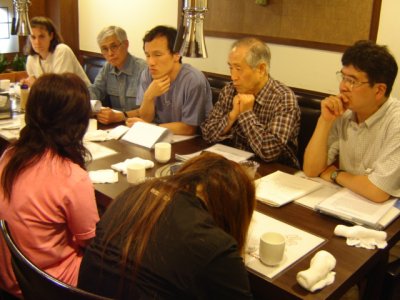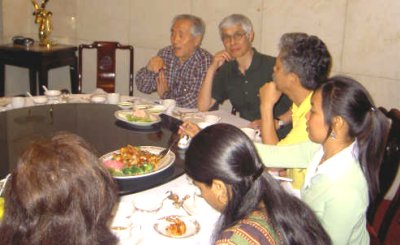From
February 25 to March 1 of this year, Life Funds for North
Korean Refugees was part of an international fact-finding mission
to Thailand, the purpose of which was to ascertain the current
situation of North Korean refugees in Thailand. To this end,
we met with the Bangkok office of the UN High Commissioner
for Refugees (UNHCR), the immigration police at Maesai (near
the Laos/Thai/Myanmar border), and Thai human rights lawyers,
as well as North Korean defectors and some of the activists
assisting them in Thailand.
The
North Korean refugees we spoke with related experiences that have
become
all too common among defectors: starvation,
separation from family, gang rape and forced “marriage” in
China, constant fear of arrest by Chinese police and of repatriation
to face imprisonment or death. One of the refugees we met with
also told us that she had had no intention of escaping to China,
but was deceived and sold into “marriage” to a
Chinese villager by an old woman who had promised to help her
find food in China.
The
emotional trauma suffered by the defectors was evident to us even during
our
relatively short meeting. One of the
human rights workers who visits the Immigration Detention Centre
in Bangkok to counsel defectors told us that the combination
of an upbringing in the North Korean system and the trauma
experienced as a refugee meant that one of the most important
things for a defector’s emotional rehabilitation was
the regaining of his or her humanity. It is clear that counselling
is a vital service for North Korean defectors both in Thailand
and upon arrival in their destination country.
The
Nation,
Feb 26, 2007 --
"During the first two
months of this year, the South Korean government
admitted 140 North Korean asylum seekers arriving
from Thailand...."
Read
the entire story here. |
|
On
the whole, we were impressed with the attitude of the Thai
authorities toward North Korean refugees. According to the
UNHCR office, the basic policy of the Thai government has been
to not repatriate North Korean asylum-seekers. We find this
to be a most
welcome development, and one that indicates leadership on
the part of the Thai government.
One
area of concern is the apparent lack of communication
between the Thai government and the UNHCR on the one hand,
and the government and police on the other. The failure to
adequately communicate Thai government policy to and among
the various police forces (regular, tourist, and immigration)
means that, for example, North Korean asylum-seekers who have
been recognized as such are incarcerated by the regular police,
who fail to recognize their refugee status. One human-rights
worker also told us about cases of regular police bursting
into safe houses and arresting asylum-seekers who were then
unable to return, in contrast to the past.
Another
area of concern is the severe overcrowding in the
Immigration Detention Centre (IDC) in Bangkok, where, according
to human rights workers and the Maesai border police, close
to 350 refugees are being held in a facility with a maximum
capacity of 130. We were unable to inspect the IDC on this
occasion because visiting privileges had been temporarily revoked
as punishment for fighting that broke out due to overcrowding.
However, reports indicate that in addition to suffering psychological
distress as a result of crowding, refugees also have insufficient
toilet facilities and sleeping space.
There
seems little doubt that the overcrowding is partially attributable
to
the rising numbers of North Korean asylum-seekers;
nearly as many North Korean refugees were processed by the
Maesai immigration centre in the first two months of this year
as in all of 2005. However, the Thai government’s policy
of arresting all North Korean refugees is undoubtedly exacerbating
conditions in the IDC.
The
ostensible reason for this change in policy is
that, lacking proper documents, the identification of North
Korean refugees
cannot be immediately verified. The Maesai immigration police
also emphasized that this policy was applied uniformly to all
refugees, not just to those from North Korea. The UNHCR representative
we met with speculated that the Thai government might be trying
to send a message to potential asylum-seekers that Thailand
will become more difficult as a transit country. If this
is so, it is cause for concern, especially as North Koreans
typically
do not remain in Thailand for any length of time, but continue
on to South Korea or the U.S.
One
concern expressed by the Maesai border police was that
they were constantly over budget due to the increasing numbers
of North Korean refugees.
The
police in Maesai welcome donations to cover the cost
of food for the
NK refugees. Feeding one person costs 45 baht (US $1.50)
per day.
Feed
a North Korean Refugee? Cick the Donate button. |
According
to the official
we spoke
with, the police are committed to providing detainees
with the same level of care regardless of their numbers,
but the cost of food, health care, translators, and transportation
to Bangkok consistently exceeds their budget.
Language
has also proved to be a stumbling block; the border police
have
been relying for translation on people working in the area
who are conversant in both Thai and Korean. However, there
has thus far been no professional interpreter consistently
available to facilitate communication with the border police
and during court hearings.
Overall,
the Maesai immigration police impressed us as having carefully
considered
the refugees’ situation and how
best to proceed from a humanitarian point of view. The official
we spoke with emphasized that this attitude was the “Thai
people’s way of thinking,” which we find especially
encouraging. We hope that we will be able to rely on Thailand’s
continuing humanitarian treatment of asylum-seekers crossing
its borders.
A
South Korean human rights worker related an incident in which she
took a taxi
in Bangkok with the two North Korean
women we interviewed. When the taxi driver asked where they
were from, and they answered that they were Korean, he asked
if they were from the North. They answered that they were South
Korean, at which the driver expressed relief—“because
the North Koreans are bad; they’re bullies and they conduct
nuclear tests.”
The
activist asked him what he would have said if they had told him they
were North Korean.
He
replied, “I
wouldn’t have even talked to
you, much less let you in my taxi.”
This
conversation reminds us that people still often fail to distinguish
between the
North Korean regime and the North Korean people. Clearly,
we still have much work to do raising awareness about
the situation
of ordinary North Koreans.
Although
North Korean refugees are the main focus of our
group's work,
one of the defectors reminded us of the longer-term view.
When asked what advice she would give to
North Koreans considering escape, she said that she could not
recommend that people leave North Korea. "Rather,"
she said, “I
want my country to become a place where it is possible to
live in
dignity, like a human being.”

Memorial shot together with
Maisai Immigration vice director and
members of Fact Finding Mission in front of Maisai
Immigration Police Building. |

Two North Korean women difectors are interviewed by the Fact
Finding Mission before going to ask the protection to Korean Embassy in Bangkok |

Participants
continued informal discussions over dinner. |


